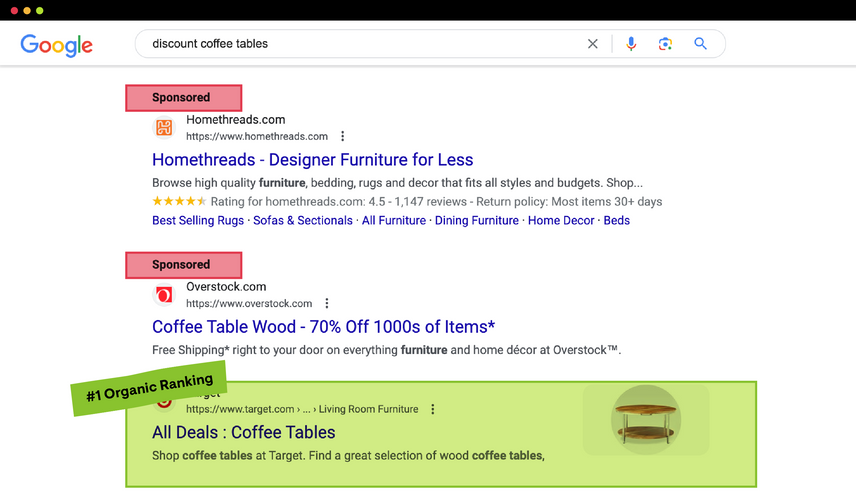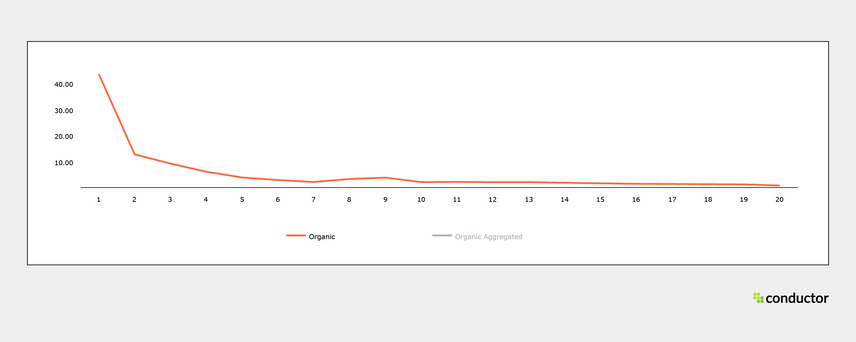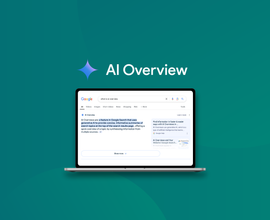Everything You Need to Improve Your SEO Ranking
SEO rankings refer to where a website appears on a search engine results page (SERP) for a particular keyword. These rankings directly affect how many people will find your website and read your content; the higher your ranking, the more people will see it (and convert.)
What are SEO rankings?
SEO rankingsRankings
Rankings in SEO refers to a website’s position in the search engine results page.
Learn more refer to the order in which websites and content appear on a search engineSearch Engine
A search engine is a website through which users can search internet content.
Learn more for a specific keywordKeyword
A keyword is what users write into a search engine when they want to find something specific.
Learn more. As an example, check out the Google SERP for the query “discount coffee tables.”

Below the ads and sponsored results, we find that Target, at the time of searching, owns the top organic search resultSearch Result
Search results refer to the list created by search engines in response to a query.
Learn more for discount coffee tables. Target ranks well on SERPs for this keyword, making it more likely people will click on that link rather than competing sites.
Why are my SEO rankings important?
Being first in something usually sounds nice, but what are the real benefits of strong SEO rankings? Simply put, you are missing out on organic traffic and conversions if you aren’t ranking in the top spot on SERPs.
Recent data shows that the top organic search result garners over 40% of clicks , and the top three results account for more than 65% of all organic traffic. Winning the top spot on SERPs, or even getting close to it, will boost your organic presence and drive massive increases in clicks and conversions.

What factors determine my SEO ranking?
The factors that determine your SEO rankings are generally covered in shadows and mystery. Some aspects we understand well, for example, titles, headings, the prevalence and quality of your internal and external links, the usage of your target keyword in the body content, and things like that.
Meanwhile, other aspects of ranking have to be passed down by word-of-mouth, like an epic Greek poem. What we do know about Google’s ranking algorithm are:
- Literally, countless factors are involved in determining your SEO ranking.
- Very few people have visibility into each factor of the ranking process.
- Very few people understand how heavily Google weighs each of its ranking factors.
And when I say ‘literally countless factors’ above, I mean it. Google uses machine learning to index and rank sites, so the factors employed are, theoretically, infinite. In addition, even if we do know some factors, we don’t know how important each one is in Google’s ranking algorithm.
That, unfortunately, doesn’t give us much to go on when discussing what specific factors are involved in your rankings. But understanding Google’s process for discovering and indexing content may hold the key to understanding its extensive ranking process.
How Google finds and ranks websites
Before getting into how well your site ranks on Google, you first need to understand how Google finds and indexes your content.
- Discovery: This is Google’s process for finding new sites and pages. Google uses XML sitemaps and internal links within content to discover new pages.
- Crawling: This refers to Google’s first pass at looking at a new or updated page after it’s been discovered.
- Indexing: This refers to Google’s process of analyzing the content and technical health of a page and deciding whether it should be added to Google’s content index.
- Ranking: This refers to Google’s process of surfacing sites and content based on a user's search query and ranking them on the SERP based on relevancy to the search, authority of the site, quality of the content, and other factors.
It’s only after these steps that Google will surface and rank your content on SERPs. This process offers the greatest opportunity to improve your rankings. In short, if Google can find, crawl, and index your site quickly—and it finds great and helpful content there—it can only help your rankings.
How can I check my SEO ranking?
Your ultimate goal with your SEO rankings is, most likely, to improve them. But you can’t improve something if you don’t know where you stand. At this point, there are several tools and features that can show you where your content ranks on SERPs. For instance, the Conductor platform includes features like Keywords and Explorer that show page-level rankings for high-value keywords across your entire domain (as well as your competitors’).
How often should I check my SEO rankings?
We’d say daily checks using your rank tracker and Google search consoleGoogle Search Console
The Google Search Console is a free web analysis tool offered by Google.
Learn more is a good place to start. Particularly because that gives you an opportunity to look at your daily rankings averages over certain time periods and get a good sense of your holistic performance. Some platforms, like Conductor, can provide daily updates on how you’re ranking for your most important keywords.
That said, be wary of checking your rankings too often. Your SEO rankings are subject to change throughout the course of a day, and dues to personalized search, SERPs will be different for different people. This is to say that your rankings are subject to change and change a lot over the course of a day, so tracking changes any more than daily is most likely overkill and not giving a true picture of your rankings.
It’s also important to check in on your rankings before you push a major change to your site or a specific piece of content. Changes like these are generally made to improve traffic, so understanding where you rank initially and how much traffic that’s driving is key to making substantive improvements and reporting on that progress.
How do I improve my SEO ranking?
As we discussed, there are so many ranking factors that it’s tricky to give hard and fast advice on what exactly will make your content jump up on the SERP. Not to mention, Google updates its algorithm constantly, which could further move the goalposts for you. That said, one thing is constant for Google: to provide the best search experience possible for users. With this in mind, there are a few factors to prioritize when trying to improve your SEO rankings.
4 SEO ranking factors to be aware of
I know, I’m the guy who just told you there were countless factors involved in this process, and now I’m putting a direct count on those factors; but for simplicity’s sake let’s break down four factors that we know Google cares about. Below are some of the factors that affect how quickly your content gets discovered, crawled, and indexed and, as a result, how it ranks.
- Your content and its quality
- Your site’s authority and trustworthiness
- Your technical SEO foundation
- Your site’s user experience
Now that you know some important aspects of your ranking, let’s talk about how to leverage them to boost your standing on SERPs.
Improve your content
First and foremost is your content quality. Google likes helpful content that is relevant to the search intent of your audience. Google will do its best to surface this kind of helpful content rather than content it views as poor, irrelevant, outdated, or outright spammy. Great content goes a long way towards improving your SEO rankings and also helps boost your audience’s trust in the content you’re providing, as they see your brand as a knowledgeable source on a topic.
Speaking practically, the best place to start improving your content is by running a content audit. An audit allows you to dive deep into the quality and performance of each piece of content you have. From there, you’ll be able to uncover opportunities to create new content for a promising keyword, improve existing content to include new information, or even delete content that is low-quality or outdated. With careful consideration, each of these moves could help your content and site start ranking for the high-value keywords you need to drive organic traffic.
Improve your brand’s trust and authority
Dovetailing off this point is the idea of your site’s authority and audience trust. While helpful content can certainly help make your site appear more authoritative and trustworthy, nothing helps improve these attributes in Google’s eyes more than backlinks. This is to say, the more that other trustworthy and authoritative sites link to your site, the better Google will perceive—and rank—your content. Basically, more backlinksBacklinks
Backlinks are links from outside domains that point to pages on your domain; essentially linking back from their domain to yours.
Learn more to other trustworthy sites show Google and searchers that you know what you’re talking about.
How do you build better backlinks? Well, your content’s quality and technical site health do help build your authority—SEO rankings often come back to the quality of your content. But some other quick win strategies for building great backlinks include:
- Reach out to relevant influencers in your space on social media to build traction on social channels.
- Start building links to relevant sites. This means business directories, relevant blogs and forums, and industry publications.
In short, you need a good foundation in PR, social media, overall marketing strategy, and content creation to build the best backlinks possible.
Improve your technical SEO and user experience
Finally, your site’s technical foundation and health are significant factors in your rankings. The better your site structure is, the easier it will be for Google to crawl and index your pages. Meanwhile, a strong site structure and good site health feed into things how quickly a page loads, which is a consideration for user experienceUser Experience
User experience (or UX for short) is a term used to describe the experience a user has with a product.
Learn more. Put it this way, if Google tried to bring you to a page that took 30+ seconds to load, would you follow through on using that site? Probably not, so Google tends to bury these sites far below higher-performing ones.
You’ll uncover a lot of opportunities to improve your site’s technical performance during your content audit. Pages with high-quality content, for example, maybe ranking poorly on SERPs due to a technical issue. In addition, ContentKing offers 24/7 site auditing , which can immediately surface technical issues on any page under your domain, as well as actionable advice so you can solve the problem before your rankings and traffic are impacted.
Basically, if you aim to provide your users with the best possible content and experience that you can, you’re well on your way toward improving SEO rankings.
Wrapping things up
Your SEO rankings are critical to the success of your content marketingContent Marketing
Content marketing is a marketing discipline with the goal of increasing awareness and scope for products and brands in the desired target group with content published on the web and offline.
Learn more strategy and business as a whole. The better your SEO rankings are for high-value keywords, the more your brand becomes a trusted authority to users. Take a peek into your own SEO rankings to see where you stand and find out how you can target the right areas to improve.
Schedule a free demo with one of our experts and learn how the Conductor platform can help you uncover opportunities to improve your SEO rankings.







